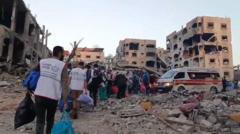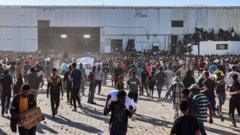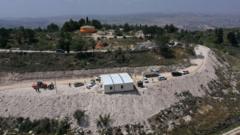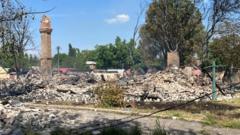A senior official from Hamas confirmed that the Palestinian militant group would not accept the new ceasefire plan proposed by the United States, following Israel's endorsement. The US envoy’s plan included a 60-day ceasefire in exchange for the release of hostages, but Hamas deemed it inadequate for the cessation of hostilities.
US-backed Ceasefire Plan Rejected by Hamas Amid Ongoing Gaza Conflict

US-backed Ceasefire Plan Rejected by Hamas Amid Ongoing Gaza Conflict
Hamas officials dismiss the latest ceasefire proposal from the US, complicating peace efforts in Gaza.
Hamas's refusal of the ceasefire comes in the wake of the reinvigorated military campaign in Gaza by Israel, which has continued since the collapse of a previous ceasefire two months prior. The proposed deal, confirmed by the White House, entails the release of ten hostages by Hamas and the return of deceased captives, but Hamas officials argued that the deal fails to meet their principal demands, including an end to the ongoing war. The Israeli government has signaled acceptance of the proposal, but Prime Minister Benjamin Netanyahu revealed that the military offensive would persist until all hostages are liberated.
The severe humanitarian crisis in Gaza persists, with reports indicating high death tolls and widespread displacement. As violent clashes and airstrikes continue, the United Nations has expressed alarm over growing food scarcity affecting nearly half a million people. Despite the precarious situation, Hamas indicated they would continue negotiations but found the current proposal insufficient. The conflict, ignited by an attack from Hamas in early October that led to significant casualties, remains a complex geopolitical issue with far-reaching implications in the region.
With the international community closely monitoring developments, the lack of progress towards a sustainable ceasefire heightens fears of a continued humanitarian disaster in Gaza.
The severe humanitarian crisis in Gaza persists, with reports indicating high death tolls and widespread displacement. As violent clashes and airstrikes continue, the United Nations has expressed alarm over growing food scarcity affecting nearly half a million people. Despite the precarious situation, Hamas indicated they would continue negotiations but found the current proposal insufficient. The conflict, ignited by an attack from Hamas in early October that led to significant casualties, remains a complex geopolitical issue with far-reaching implications in the region.
With the international community closely monitoring developments, the lack of progress towards a sustainable ceasefire heightens fears of a continued humanitarian disaster in Gaza.






















